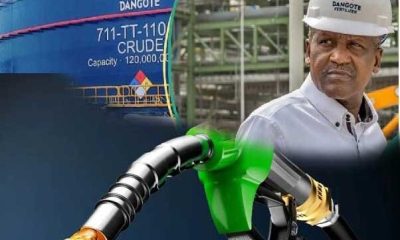Business
Dangote Refinery Assures Consistent Petrol, Diesel Supply As He Delivers 45 million Litres of Petrol And 25 million Litres of Diesel Daily

Dangote Petroleum Refinery has reaffirmed its commitment to ensuring a consistent and uninterrupted supply of Premium Motor Spirit (PMS) and Automotive Gas Oil (diesel) across Nigeria, boasting a daily production capacity that exceeds domestic demand.
Speaking on the development, Anthony Chiejina, Group Chief Branding and Communications Officer of Dangote Industries Limited, said the refinery’s operations are driven by a dedication to national energy stability and consumer confidence.
“Our refinery is currently loading over 45 million litres of PMS and 25 million litres of diesel daily, which exceeds Nigeria’s demand,” Chiejina said.
“We are working collaboratively with regulatory agencies and distribution partners to guarantee efficient nationwide delivery. Dangote remains steadfast in its commitment to meeting the energy needs of Nigerians.
This significant production capacity not only guarantees local supply but also enhances energy security and reduces dependence on imports.”
He highlighted the economic benefits of local production, noting, “We have reduced foreign exchange outflows and increased inflows, which in turn supports the naira and strengthens the economy.”
Addressing recent criticisms of the new tariff policy, Chiejina described them as misguided, asserting that the measure is intended to protect domestic industries.
“Dumping engenders poverty, discourages industrialisation, creates unemployment, and leads to revenue loss for the government.
Across the world, nations protect their local manufacturers and industries from the threat of dumping.
Dumping destroyed our textile industry, which was once a major employer of labour and creator of wealth,” he said.
He urged the government to strengthen enforcement mechanisms to prevent the influx of substandard and toxic petroleum products, warning that past dumping practices discouraged industrial investment and undermined local production.
The new tariff policy, Chiejina noted, would benefit local refiners and encourage fresh investment in Nigeria’s downstream oil sector.
Chiejina also praised President Bola Ahmed Tinubu for approving the policy.
“President Bola Ahmed Tinubu continues to embody courageous and visionary leadership, renewing the hope of Nigerians and restoring investor confidence in the nation’s economy.
His administration’s bold and business-friendly reforms are reshaping the downstream oil and gas sector, unlocking new opportunities for industrial growth and national prosperity,” he said.
He warned that failing to protect local industries could lead to large-scale dumping from Asia and Europe, potentially crippling domestic refineries and allied industries.
Chiejina urged stakeholders to align with the government’s vision for a self-sustaining energy sector, emphasizing “national progress can only be achieved through shared commitment to policies that strengthen local industries and protect the economy.”
Since starting production in September 2024, Dangote Petroleum Refinery has significantly reduced fuel scarcity and stabilized market prices. Chiejina highlighted the impact on affordability, noting that PMS prices dropped from an average of N1,030 per litre in September 2024 to between N841–N851 per litre in September 2025, while AGO prices fell from N1,400–N1,700 per litre to around N1,020 per litre.
“I want to assure Nigerians that the Dangote Refinery is fully committed to maintaining an uninterrupted supply of petrol throughout the festive period.
Nigerians can look forward to a Christmas and New Year free of fuel anxiety,” said Aliko Dangote, President of Dangote Industries Limited.
He further noted that fuel prices in Nigeria remain well below regional averages, with neighbouring West African countries charging between $1.20 and $2.00 per litre, compared to roughly $0.60 per litre in Nigeria, demonstrating the refinery’s profound effect on market stability and affordability.




















